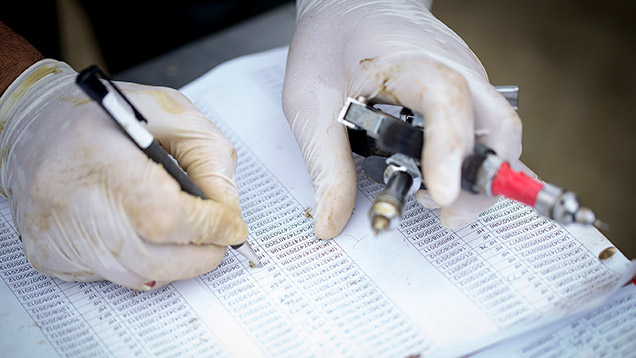‘We may never eradicate bovine TB in England’ – Defra chief scientist

Defra’s chief scientist has expressed his doubts over whether eradicating bovine TB in England is possible, but said that TB-free status is an achievable goal.
Speaking at an NFU conference on bovine TB on Monday (17 November), Professor Ian Boyd said it was unlikely that England would ever be able to eradicate the disease completely.
“Truly, do we think we can eradicate TB from England? Almost certainly not,” he told delegates at the union’s headquarters in Stoneleigh, Warwickshire.
“Getting rid of it completely is probably not possible. But we can get it to the levels where we have officially TB-free status.”
Prof Boyd said it would “take decades” for the country to reach this status and no one should underestimate the difficulty of the task that lies ahead. But he remained confident that England could achieve officially TB-free status by 2038.
See also: Bovine TB rates continue to fall
The country was in a very different position compared with the time when it almost eradicated bovine TB in the 1960s and 1970s, he said.
Bovine TB disease management
We already have:
- Risk-based trading
- Pre-movement testing
- Tuberculin testing
- Test and slaughter
Available but not used to full potential:
- Herd genetics
- Health and welfare
- Farm biosecurity
- Badger population control
- Badger vaccination
- Badger-cattle contact
Not available yet:
- Cattle vaccination
Source: Defra
“The presence of the badger population is part of the story – but not the only story,” he added.
Prof Boyd explained that the enemy was not badgers or farmers, but was the disease itself – the M.Bovis bacterium.
He said TB was continuing to spread across England out of the South West, and the disease was spreading north-east.
Achieving an officially bovine TB-free status in England would involve “using all the tools in the box”, including risk-based trading, closed herds, health and welfare of animals.
Also, it would require TB testing, test and slaughter of infected cattle and potentially vaccination.
Prof Boyd said there was “no doubt” that badgers were a root of the problem.
He said the government was a “very long way” from coming up with a methodology for gassing badgers. However, research for testing the disease in badgers was “very much closer”.
But he added: “It is possible that only about 6% of infection can be traced back originally from badgers and the badger population.
“That does not mean to say they are not an important part of the problem.”
Prof Boyd highlighted cattle-to-cattle transmission as the biggest problem.
“I think there is an immense amount of evidence for cattle-to-cattle transmission,” he said.
Finally, he said there was “no doubt” that the UK has the biggest bovine TB problem in Europe.
“Our European partners want to help. But they don’t seem to have this problem and they don’t want to get it [bovine TB] from us.”
However, Christianne Glossop, chief veterinary officer for Wales, took issue with Prof Boyd’s comments and said TB eradication was very much the target in her country.
“Whether or not TB eradication as a pure definition is achievable or not, as far as I am concerned that’s what we are aiming for in Wales, with albeit perhaps with the imperfect tools, but the tools that are available to us,” she said.
TB eradication was a “long journey” that could take 20-30 years, Prof Glossop added. “I believe that TB eradication is a long-term, ambitious, achievable objective.”
Cambridge scientist Andrew Conlan repeated the assertion put forward by many scientists that there was “no magic bullet” to eradicating bovine TB.
He urged the country to learn the lessons from other countries that have got on top of the disease, especially New Zealand.
This would involve proactive and reactive culling of badgers and badger vaccination.
For farmers, it would require more cattle controls, including increased frequency of testing, longer movement restrictions, stricter biosecurity and cattle vaccination.
“We need to bring in the stakeholders and put them in charge of the disease and introduce measures across the whole of the disease spectrum – that is the only way we are going to make progress,” he added.
Meanwhile, Malla Hovi, head of veterinary advice on the APHA/Defra TB programme, revealed that a six-month TB testing regime would be introduced in Cheshire soon – a county on the “edge area” of the disease.
She described the tougher controls in the county as “short-term pain for long-term gain”.
Cheshire dairy farmer Phil Latham is in favour of increased routine TB surveillance in his county, which he said was a better system than random radials.
But he said he was “disappointed” to hear more talk of extreme cattle controls for farmers, which he described as “draconian” and had proven to be a failure in the past.
Mr Latham said: “At what point is the tipping point for Defra to adapt a policy which is coherent and includes badgers within the policy?
“I’m heartened by the idea that you [Defra] want a systems-based policy, but you systematically denied a role for badgers within that policy. So we have no coherence and you are avoiding the subject for political reasons. It is hugely disappointing.”
Another farmer told the conference that livestock farmers were suffering “long-term pain for very little gain”.
